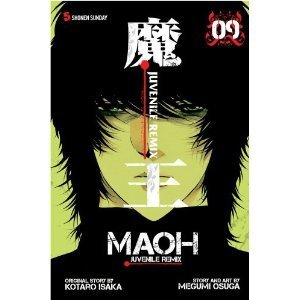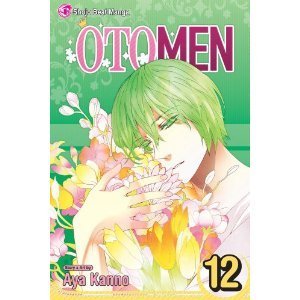S.Q. Eries's Blog, page 68
April 30, 2012
Ancient Olympic Fun Fact 18
2012 is significant in that it is a presidential election year, a leap year, and a summer Olympic year! The modern Olympics, of course, were inspired by the ancient Greek Olympics, a subject I’ve been researching for my work in progress. So in these months leading up to the 2012 London Games, I’ll be posting weekly tidbits about the original athletic festival that started it all.
Here’s this week’s fun fact:
Foul = Flogging
No red flags or verbal warnings. If an athlete committed a foul, he faced a group called the Whip-Bearers. Using switches from the lycos bush (a kind of willow), these men publicly flogged violators. Not only did the punishment produce painful welts, it was humiliating. All competitors were free men, but that kind of flogging was usually reserved for slaves.
Tune in next week for more about the ancient Olympics!








April 26, 2012
Manga Review: A Bride’s Story Vol. 3
 Kaoru Mori is best known for her work, Emma, an exquisite romance/slice-of-life set in Victorian England. Her latest work to be released in the United States, A Bride’s Story, is also a historical/slice-of-life but is vastly different than Emma. Set in Central Asia in a rural town near the Caspian Sea during the early 19th century, A Bride’s Tale revolves around a young woman, Amir, who arrives from a distant village across the mountains to marry Karluk, a boy 8 years her junior.
Kaoru Mori is best known for her work, Emma, an exquisite romance/slice-of-life set in Victorian England. Her latest work to be released in the United States, A Bride’s Story, is also a historical/slice-of-life but is vastly different than Emma. Set in Central Asia in a rural town near the Caspian Sea during the early 19th century, A Bride’s Tale revolves around a young woman, Amir, who arrives from a distant village across the mountains to marry Karluk, a boy 8 years her junior.
Back Cover Blurb
A young widow, Talas opens her home to the researcher Mr. Smith, who has ventured to her town to continue his studies. However, when Talas’s uncle begins to see Smith as an impediment to his plans to wed his son to Talas, the old man’s schemes land the Englishman in prison! Far from friends and even farther from home, Smith’s outlook seems grim…
The RevieW
Fans of Emma will really enjoy Volume 3 of A Bride’s Story, the main focus of which is Mr. Smith. Mori-sensei seems to have a penchant for Englishmen falling for women that come from completely different backgrounds. In Emma, it was a young man of the gentry and a maid; here we have Mr. Smith and the widow Talas.
There are actually quite a few parallels between Talas and Emma. Talas’s household consists of her and her mother-in-law, and the affection the two have for one another is akin to that between Emma and her mistress Kelly. Talas’ mother-in-law worries about what will happen to Talas once she passes on, but Talas is reluctant to remarry and leave her mother-in-law behind. Talas even looks similar to Emma, though Mr. Smith is the one wearing the glasses.
The wonderful thing about the attraction that grows between Talas and Mr. Smith is that it comes about gradually and is rooted in mutual respect. The other nice thing about their relationship is that, unlike Amir and Karluk, there’s no awkward age gap. Both are adults and approximately the same age so modern Western readers can enjoy their interaction without any squick factor. But just as in Emma, a patriarch in power disapproves of the couple’s relationship so the volume closes with Mr. Smith and Talas forcibly separated. I really hope though that that’s not the last we see of her.
This being a slice-of-life, it includes several scenes of Talas doing chores as well as an entire chapter about Amir, Karluk, and Pariya scrounging up a meal at the market. “Eating at the Market” doesn’t advance the plot, but it’s a fun and fascinating glimpse into the foods of Amir’s world.
One final note: I absolutely adore this book’s packaging. The brown hardback binding and gold lettering are an elegant touch, and the colorful dust jacket is a treat for the eyes. It’s almost double the price of its paperback counterparts, but Yen Press presents A Bride’s Story as one would a classic piece of literature, a nice match for Mori-sensei’s beautiful artwork.
In Summary
The series title is A Bride’s Story, but Volume 3 could be called “A Nearly Engaged Englishman’s Story.” Mori-sensei introduces a romantic interest for Mr. Smith in the form of the young widow Talas, and those who enjoyed Emma will likely enjoy the interactions between these lovers from vastly different worlds.
First published at the Fandom Post.








April 23, 2012
Ancient Olympic Fun Fact 17
2012 is significant in that it is a presidential election year, a leap year, and a summer Olympic year! The modern Olympics, of course, were inspired by the ancient Greek Olympics, a subject I’ve been researching for my work in progress. So in these months leading up to the 2012 London Games, I’ll be posting weekly tidbits about the original athletic festival that started it all.
Here’s this week’s fun fact:
The torch relay was not part of the original Olympics
As iconic as the Olympic torch is, there was no equivalent in the ancient athletic festival. Relay races weren’t even part of the events, and the closest thing the Greeks had to an Olympic flame was the sacred fire of Hestia, which was used to light all the other altars at Olympia.

Olympic Torchholders. The owners of our hotel in Olympia had a couple of medalists in their family.
Tune in next week for more about the ancient Olympics!








April 19, 2012
Manga Review: Dengeki Daisy Vol. 9
Bad boy/good girl love stories are popular in shojo manga, and for those who enjoy a dash of cyber intrigue in their romances, Kyousuke Motomi’s Dengeki Daisy is worth checking out. Volume 9 has recently been released, and you can read on for the review. (Also, for those who are interested, you can click here for my reviews of earlier volumes).
 The story centers on orphan Teru Kurebayashi, who, after the death of her beloved older brother, finds solace in the messages she exchanges with Daisy, an enigmatic figure who can only be reached through the cell phone her brother left her. One day, she accidentally breaks a window at school, and as a result winds up becoming a servant for Kurosaki, the delinquent school custodian. Although brusque and rude, he somehow always shows up in her time of need, and Teru finds herself increasingly drawn to him.
The story centers on orphan Teru Kurebayashi, who, after the death of her beloved older brother, finds solace in the messages she exchanges with Daisy, an enigmatic figure who can only be reached through the cell phone her brother left her. One day, she accidentally breaks a window at school, and as a result winds up becoming a servant for Kurosaki, the delinquent school custodian. Although brusque and rude, he somehow always shows up in her time of need, and Teru finds herself increasingly drawn to him.
Back Cover Blurb
As Teru comes to terms with Kurosaki’s past wrongdoings, Kurosaki searches for the culprit who is trying to resurrect the “Jack Frost” virus he created. But when he learns that Teru might be in danger, will he keep his promise to leave her alone, or will the two be reunited?
The RevieW
This volume comes to a climax for Teru/Kurosaki fans. After putting our couple through the emotional wringer for several chapters, they are finally reunited. Their meeting isn’t quite what you’d expect it to be; Motomi-sensei builds up all this dramatic anticipation, making the story look like it’s going to go one way and then shifts it wildly in the other direction. Still, the “low handed” manner in which Teru gets her man back is definitely keeping in character for our couple, and the close of Chapter 41 should be fluffy enough to satisfy the romantics.
Motomi-sensei plays a similar tactic in Chapter 42 with both Teru and Kurosaki falling for a fast one. To be honest, their friends’ actions come across as perplexing, especially given Riko’s strongly negative response to Kurosaki’s question about “the sacred rite between a man and a woman.” Part of me feels as if Motomi-sensei inserted the scene just for the shock of Kurosaki seeing Teru in a bathrobe. At any rate, the chapter extends the fluffiness just a little longer before our cast returns to the regular world.
After all the talk in Chapter 42 about Kurosaki having to go into hiding, it feels anticlimactic to have Kurosaki and Teru back in a normal school setting. Once they had their reunion and heart-to-heart, I honestly thought the series would wrap up. But it continues on, with the scheming Akira as the last bit of unresolved business. But so much has already been settled with Kurosaki’s secrets and our main couple’s feelings for one another, Akira almost doesn’t seem to matter anymore. Motomi-sensei’s going to have to shake things up a bit to keep things interesting for this title.
In Summary
The story builds to a climax with Teru doing all in her power to reunite with Kurosaki. Romantics should be pleased once everything comes to a head, but so much gets resolved that the series feels as if it should conclude here instead of continuing with another volume.
First published at the Fandom Post.








April 16, 2012
Ancient Olympic Fun Fact 16
2012 is significant in that it is a presidential election year, a leap year, and a summer Olympic year! The modern Olympics, of course, were inspired by the ancient Greek Olympics, a subject I’ve been researching for my work in progress. So in these months leading up to the 2012 London Games, I’ll be posting weekly tidbits about the original athletic festival that started it all.
Here’s this week’s fun fact:
Wars went on hiatus during the Olympic Games.
Just as the modern Olympics strive to inspire international peace, the purpose of the ancient Games was to promote harmony among the Greek states. Probably the most tangible aspect of this was the Olympic Truce. Specifically, the Truce forbade participating states from taking up arms, pursuing legal disputes, and carrying out death penalties. With military conflict at a standstill, spectators could travel to Olympia in relative safety. The original duration of the Truce was one month but eventually extended to three months as the Games attracted visitors from further off.
By the way, violating the Truce resulted in heavy fines, and the Elean organizers were no respecter of persons when it came to fining. King Philip of Macedon, father of Alexander the Great, got fined because his soldiers robbed an Athenian traveler en route to the Games (he also had to compensate the victim for his financial loss). On another occasion, Sparta got fined for waging war at the time of the Truce. The Spartans refused pay, claiming the fighting took place before the Truce. Elis and Sparta hit an impasse, and the Spartans got barred from Olympia for the next two decades.
As to how the Spartans returned to the Games, that’s an interesting story, one my work in progress uses for its opening scene. 
Tune in next week for more about the ancient Olympics!








April 12, 2012
Manga Review: Bakuman Vol. 10
Bakuman is the latest collaboration of Ohba and Obata, the creators of the wildly popular Death Note series. Unlike Death Note, Bakuman is more or less grounded in reality, but it is no less entertaining as it follows the ups and downs of a mangaka duo as they strive to make it big in the publishing world!
 This series is a personal favorite of mine, and Viz Media has just released Volume 10. (My reviews of earlier Bakuman volumes can be found here.)
This series is a personal favorite of mine, and Viz Media has just released Volume 10. (My reviews of earlier Bakuman volumes can be found here.)
Back Cover Blurb
Moritaka and Akito will need to come up with an amazing new manga idea if they ever hope to get back into Weekly Jump magazine, and they only have six months to do it! But with Hattori, their former editor, helping behind the scenes, the duo might have everything in place to create the perfect story.
The Review
When Miura took over as Ashirogi's editor, I honestly thought Editor Hattori would fade into the Jump office background. However, he's popped up more frequently in recent chapters, and with Volume 10, he's back to the forefront as his efforts to help the boys out of their slump moves from indirect to in-your-face direct. To be honest, it's difficult to believe a busy magazine editor would be that invested in a former artist (and that Miura would follow Hattori's instructions without question), but Hattori has a chemistry with Ashirogi that Miura doesn't so it's good to see them collaborating again. Plus, the chapter where Ashirogi tails Hattori as "research" is ridiculously fun and funny.
There's actually quite a bit of humor in this installment, ranging from Iwase's attempts to attract Hattori to newlywed life with Akito and Kaya to wacky glimpses of the other Jump mangaka. However, the question that will keep readers turning the pages is: will Team Ashirogi deliver that genius new series on time? Occasionally, the dialogue gets heavy with manga comparisons and references to rival artists, and it becomes a bit frustrating to get acquainted with the boys' newest manga idea only for it to get scrapped. At the same time, it also allows readers to experience Ashirogi's frustration and desperation as they go down to the wire.
So when inspiration finally hits, it's that much more thrilling watching them hurry to make it to the final serialization meeting. And even that turns into a nail-biting chapter as the editors' evaluation of the work goes from "ready for serialization" to "capable of surpassing Nizuma." The scene drags out so long, I seriously would've had a tantrum if the final decision wasn't included in this volume (but it is, thank goodness).
So it's not a supernatural thriller with cat and mouse games involving death gods, but the Bakuman creators keep things plenty thrilling nonetheless.
In Summary
The events of six months fly in Volume 10! Occasionally, the text gets bogged down with all the references to the various manga titles we've encountered thus far, but for the most part, the tension stays high with the boys burning through ideas in their efforts to create a new manga series.
This title is highly recommended for young teens and up.
First published at the Fandom Post.








April 9, 2012
Ancient Olympic Fun Fact 15
2012 is significant in that it is a presidential election year, a leap year, and a summer Olympic year! The modern Olympics, of course, were inspired by the ancient Greek Olympics, a subject I've been researching for my work in progress. So in these months leading up to the 2012 London Games, I'll be posting weekly tidbits about the original athletic festival that started it all.
Here's this week's fun fact:
A month of compulsory training took place the month before the Games.
Just as modern athletes undergo a qualifying process to enter the Olympics, the ancient Games had their own sort of preliminaries. This took place in Elis, the city-state that organized the Games (Olympia lay in Elean territory). Having the athletes gather in advance allowed officials time to weed out weak candidates and verify eligibility. In addition, there was a psychological aspect to bringing in the athletes early.
The Olympic Judges supervised the training, and they used to opportunity to reinforce their absolute control over the Games. Sessions were grueling, and athletes had to obey the Judges' every word and eat only what they provided. And although trainers and relatives might accompany competitors to Elis, they could in no way interfere with the proceedings.
A consequence of this month-long boot camp was that it limited the pool of individuals who could enter. For most citizens, taking an entire month off wasn't affordable (and by the way, that didn't include travel time or the actual Olympic festival itself). So unless you were a person of means or had sponsors, clearing this first hurdle to the Games was difficult.
Tune in next week for more about the ancient Olympics!








April 5, 2012
Manga Review: Maoh: Juvenile Remix Vol. # 09
I don't usually review a whole lot of shonen manga, and I review even fewer violent shonen titles. Somehow, though, I wound up with the Maoh series, which has murder and mayhem in spades.(My reviews of earlier Maoh: Juvenile Remix volumes can be found here.) However, it's more of a supernatural thriller than a gratuitous show of blood splattering and has some interesting heroes (if you can stomach all the casualties along the way).
 The story takes place in Nekota City, which is not so much a dystopia as it is a community on the decline (think Gotham City from Batman). Inukai is the mysterious leader of a vigilante group called Grasshopper, which is at odds with the city's redevelopment plan. Inukai is hailed as a hero among the common folk of Nekota, but is he really all that he seems?
The story takes place in Nekota City, which is not so much a dystopia as it is a community on the decline (think Gotham City from Batman). Inukai is the mysterious leader of a vigilante group called Grasshopper, which is at odds with the city's redevelopment plan. Inukai is hailed as a hero among the common folk of Nekota, but is he really all that he seems?
Back Cover Blurb
To get revenge for his brother's death, Junya decides to follow in Ando's footsteps. To get to the bottom of who killed Ando, Junya will have to develop his own special powers. But before he can deal with Inukai, another group of misfits might beat him to it.
The Review
Previous chapters have given glimpses of Fraulein, but Volume 9 provides a really good look at the organization. Unlike Grasshopper which is simply violent, Fraulein is violent and depraved, a culture that definitely stems from the mob boss and his son. Sex, drugs, and blatant disregard for human life is par for the course, and though they've been lurking in the shadows, they seem to be positioning themselves to join the power grab for Nekota City.
Meanwhile, Junya's normal life is turning into a distant memory. Our favorite assassin, Semi, and his boss Iwanishi show up again, this time at Junya's behest. In addition to seeing Semi slit more throats and throw a couple tantrums, we get more insight into Junya's power. Just as Ando and the Duce bartender had their limits, Junya's "against the odds" power has limits as well. It's more complicated than a radius of influence, but the fact that Junya isn't completely omnipotent will force him to think (just like his brother!), making for a more intriguing plot.
As for Inukai, his political popularity continues skyrocketing while Nekota's puppet mayor loses his tenuous grip on what little control he had. As it turns out, the seemingly upright Mayor Tatsumi has a weakness, one that Fraulein gleefully exploits. Inukai, on the other hand, they've targeted for elimination, but even having learned of Fraulein's plot, Inukai maintains a calm, fatalistic attitude of the future. Junya, however, is determined that Inukai's death comes at his own hands, even if that means saving Inukai from Fraulein (yes, there's irony in that). This volume ends strongly, with the anticipation of how one lone youth will fare against an entire organization.
In Summary
Junya gets more embroiled with the underworld, he gains a new enemy: the shadowy organization Fraulein. But Junya's quickly picking up the rules of survival, plus he's learned to harness his own special powers. The tumultuous battle for Nekota City continues with more intrigue, more killing, and the introduction of some new degenerates who make Inukai look like a decent fellow.
First published at the Fandom Post.








April 2, 2012
Ancient Olympic Fun Fact 14
2012 is significant in that it is a presidential election year, a leap year, and a summer Olympic year! The modern Olympics, of course, were inspired by the ancient Greek Olympics, a subject I've been researching for my work in progress. So in these months leading up to the 2012 London Games, I'll be posting weekly tidbits about the original athletic festival that started it all.
Here's this week's fun fact:
The perks of an Olympic victor were many.
Just as Olympic fame and glory lead to endorsements and other valuable opportunities for modern-day athletes, so the winners of the ancient games benefited from their victories. Upon their return, their towns gave them a hero's welcome, marked with feasting and celebration. Many states allowed Olympic victors to dine for life at the public expense. Some also granted free lodging or theater seats (prime ones, of course) while others raised statues in their athletes' honor.
Winners also received the right to erect statues of themselves at the Olympic shrine. These images, generally of stone or bronze, were very expensive, but friends, family, or other supporters would often foot the bill and pay a little extra to commission a poem of praise for the plinth. And as mentioned in Fun Fact 7, a victor eventually could be honored as a god.
And you thought gold medalists got stellar treatment…
Tune in next week for more about the ancient Olympics!








March 29, 2012
Manga Review: Otomen Vol. 12
There are many stories about tomboys, girls with boyish tendencies, but what about the opposite? In fact, what would you call a boy with girly interests? The manga answer is: Otomen!
 For those unfamiliar with this series by Aya Kanno, "otomen" is a play on the Japanese word otome (乙女), meaning "young lady" or "mistress," and the English word "men." The plot centers around Asuka Masamune, the manliest guy in his high school. However, he has a secret: the things he really loves are sweets, shojo manga, and sewing. He hides this part of his life from everyone until he meets Ryo Miyakozuka, the least feminine girl in school. Volume 12 of the series has just come out and you can read on for the review! (For those interested in my review of Volume 11, click here.)
For those unfamiliar with this series by Aya Kanno, "otomen" is a play on the Japanese word otome (乙女), meaning "young lady" or "mistress," and the English word "men." The plot centers around Asuka Masamune, the manliest guy in his high school. However, he has a secret: the things he really loves are sweets, shojo manga, and sewing. He hides this part of his life from everyone until he meets Ryo Miyakozuka, the least feminine girl in school. Volume 12 of the series has just come out and you can read on for the review! (For those interested in my review of Volume 11, click here.)
Back Cover Blurb
Secretly taking a baking class for men, Asuka is relieved that there's a safe haven where he doesn't need to hide his girly side from his anti-otomen mother. But when she finds out that he's been attending this class, things get set to explode!
The Review
Teen romance takes a backseat in Otomen Volume 12. In fact, Ryo only shows up in a couple panels. Instead, the focus is on the mysterious pastry chef of Violet. The series has been hinting for a while at the connection between him and Asuka, but now we finally learn of their true relationship as well as that of Amakashi and a couple other characters.
The circumstances by which the chef comes to live with Asuka and his mother are a bit over-the-top, but once past that, the otomen bonding that takes place between the two is really, well, cute. Kanno-sensei goes off the deep end again a chapter later with a parody of a violent yakuza kidnapping. The gangster and the demand he makes are nothing short of laughable, but the chef and Asuka treat the situation so seriously that it works, creating a dramatic revelation scene followed by a touching conclusion.
For the final chapter in this installment, the focus switches back to love – as through the eyes of the poet of Ginyuri. Amakashi gets his moment to sparkle (literally) in the spotlight as Kanno-sensei delves into his particular otomen obsession. The ending is somewhat bittersweet, but considering the way other shojo manga have depicted fordidden student-teacher love affairs, I'm glad Kanno-sensei handled this story the way she did.
In Summary
Asuka continues hiding his otomen self from his mom, but he finds solace as he and the Violet pastry chef connect on a deeper level. Their bond, though, goes even further than he expects. It's a couple of close calls and one big revelation for our hero in this installment of Otomen.
First published at the Fandom Post.











